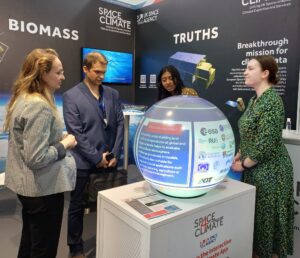‘I’m particularly passionate about monitoring methane from space so I was able to answer a lot of questions on that’ – our COP28 blog by Isabelle Crozier-Morris
As one of three COP28 Volunteers supporting Space4Climate and representing the UK space climate community at COP28, Isabelle Crozier-Morris spent almost two weeks in Dubai in December 2023. The experience was a contrast to her full-time job as an Earth Observation research scientist at Ordnance Survey (OS). Here she writes about her new perspective on the world climate summit and the skills she gained:
I have had a ‘wiggly’ career path to end up working in the space sector. After studying BSc Geography at university, my dream was to work at Ordnance Survey. It was only halfway through Ordnance Survey’s graduate scheme that I discovered the space sector. Doing a placement in the Earth Observation team gave me experience in project management and led to me heading my first technical project. From here, I became a research scientist, specialising in Earth Observation.
My role is very technical, which is something I have grown to enjoy. My first job was for British Airways at check-in at Heathrow Airport where I communicated with people from all walks of life and was kept on my toes with constant problem solving! Going to COP28 was a great opportunity to combine my existing communication and technical skills, whilst building my wider knowledge of the space sector – and occasionally drawing on those BA experiences!

I was one of the UK team on the Space4Climate stand in the Green (public) Zone, discussing the UK space sector’s significant contribution to tackling climate change using space-based data. Coming into COP, I was unsure who would be visiting the stand, the variety of people ended up surprising me. I spoke to investors, marketing managers, renewable energy companies, students (from five years old to 25!), some who knew about the space sector, some who did not.
Methane monitoring capabilities
At OS I have had the opportunity to work on a variety of interesting projects, from heat mapping to monitoring peatlands using space-based data. I am particularly passionate about monitoring methane from space, so I was able to answer a lot of questions on methane from stand visitors. Geospatial data can unlock the value in Earth Observation data, by providing the context needed to take the information and turn it into insights. Combining space-based data and geospatial data is something I focus on, working at a national mapping agency.
Methane is a highly potent greenhouse gas. In the fight against climate change, methane has the potential for a substantial short-term impact on climate change and more and more data are becoming available to monitor it. There are freely available options, such as from European Space Agency’s Sentinel-5P, and commercial options, such as from Space4Climate members GHGSat. The freely available data enables monitoring of large areas. Its spatial resolution, the area of the ground represented through one pixel, is on the kilometre scale (7×3.5km2). Commercial data brings the ability to measure point sources of methane, through its spatial resolution of 30metres. Both types are important, as they allow us to prioritise our resources in tackling the impact of methane on climate change.

Need for international standards
I helped organise the UK Space Agency and Space4Climate methane event on the UAE Space Agency’s Space Pavilion stage: ‘Monitoring Methane from Space: Towards an Internationally Recognised Standard’. The ability to measure methane from space is rapidly evolving. There is a need for common agreed processes and standards for analysing the data. The output of the event was an invitation for world experts to come to the UK for a workshop around methane standards, due to be held in March 2024. This is looking to continue the conversation around internationally recognised methane analysis standards. Bringing together the event, and seeing it run smoothly, was rewarding, especially as this experience tends to sit outside of my day job.
In addition to my EO skills, I am passionate about gender diversity and I was glad to see this was being focussed on at COP28. Visiting the Women’s Pavilion was a particular highlight. Being at COP meant I was able to take part in events outside of my day job and meet like-minded people who are passionate about making a difference. I am hopeful that the shared passion, skills and commitment of everyone who worked so hard at COP28 will ensure that progress is made in tackling climate change.
Going to COP28 was a great opportunity to combine my existing communication and technical skills, whilst building my wider knowledge of the space sector

